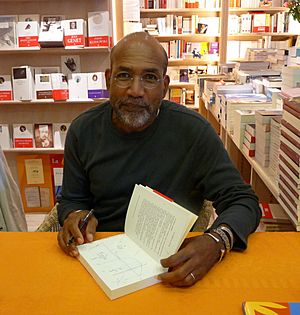Patrick Chamoiseau facts for kids
Quick facts for kids
Patrick Chamoiseau
|
|
|---|---|

Chamoiseau in Strasbourg, June 2009
|
|
| Born | 3 December 1953 |
| Works | , Texaco |
| Style | Novels, essays, tales, film scripts |
| Awards | Prix Goncourt |
Patrick Chamoiseau (born December 3, 1953) is a famous French writer from Martinique, an island in the Caribbean. He is well-known for his part in the créolité movement, which celebrates the unique mix of cultures in the Caribbean. Patrick Chamoiseau writes many different types of books, including novels, essays, children's stories, and even movie scripts. His novel Texaco won a big award called the Prix Goncourt in 1992.
Contents
About Patrick Chamoiseau
Patrick Chamoiseau was born on December 3, 1953, in Fort-de-France, which is the capital city of Martinique. He still lives there today. After studying law in Paris, France, he went back home to Martinique. He was inspired by another writer, Édouard Glissant, to learn more about and celebrate the local Creole culture.
In 1981, Patrick Chamoiseau helped write a history book about the Antilles islands during the time of Napoleon Bonaparte. Later, in 1989, he co-wrote an important book called Éloge de la créolité (which means In Praise of Creoleness) with Jean Bernabé and Raphaël Confiant. This book helped explain the idea of "Creoleness" to the world.
Patrick Chamoiseau has won many awards for his writing. In 1990, he received the Prix Carbet for his book Antan d'enfance. This was the first part of a series of three books about his childhood, called Une enfance créole. His 1992 novel Texaco is considered a masterpiece. In 1999, Chamoiseau received a Prince Claus Award for his important contributions to Caribbean society.
Patrick Chamoiseau's Writing Style
Patrick Chamoiseau's writing often explores how written stories and spoken stories are connected. He uses a special style to bring the sounds and rhythms of oral storytelling into his books.
Men and Women in Stories
The relationships between men and women are a common topic in Caribbean literature. Patrick Chamoiseau, like many other writers from the Caribbean, explores this theme in his books. Many male writers from the Caribbean often write from a "masculinist" point of view. This means their stories often focus on the experiences and feelings of men.
Chamoiseau helped start the Créolité movement, which aimed to bring pride to men in the Antilles archipelago. For a long time, European colonizers had prevented Antillean men from holding powerful positions. This made many feel less important. The movement wanted to help them regain their sense of strength and identity.
However, Chamoiseau also writes stories that show different sides of men. For example, in his children's story "Kosto et ses deux enfants," he shows a male character who is a good and respected father. This is different from how men are sometimes shown in Caribbean literature, where they are often portrayed in a negative way.
What is Créolité?
Many writers from the Caribbean try to answer a big question: "What does it mean to be Caribbean?" Patrick Chamoiseau and his friends use the word "Creoleness" to answer this. Creoleness is about how different cultures mix and adapt in places like islands. In the Caribbean, this means a blend of African, Polynesian, and Asian cultures with those of the European colonizers.
This idea of Creoleness is important to Patrick Chamoiseau's writing. He carefully chooses how he writes to show this concept. For example, in his book Creole Folktales, the stories are set around the 1600s in the French Antilles. Chamoiseau uses a storyteller to narrate and writes in Creole. This helps to bring back the old tradition of oral storytelling from the Antilles. By doing this, Chamoiseau makes sure that the spoken history and culture of the Antilles are remembered and shared.
Awards and Honors
Patrick Chamoiseau has received many awards for his literary works:
- 1986: Prix Kléber Haedens, for Chronique des sept misères
- 1986: Prix de l'île Maurice, for Chronique des sept misères
- 1987: Prix international francophone Loys Masson, for Chronique des sept misères
- 1988: Grand Prix de la littérature de jeunesse, for Au temps de l’antan
- 1989: "Mention" Premio Grafico Fiera di Bologna per la Gioventù de la Foire du livre de jeunesse de Bologne (Italie) for Au temps de l'antan : contes du pays Martinique
- 1990: Prix Carbet de la Caraïbe, for Antan d'enfance
- 1992: Prix Goncourt for Texaco
- 1999: Prince Claus Award
- 2002: Prix Spécial du Jury RFO, for Biblique des derniers gestes
- 2008: Prix du Livre RFO, for Un dimanche au cachot
- 2010: Commandeur des Arts et des Lettres
- 2016: Prix international Nessim Habif, Académie royale de langue et de littérature françaises de Belgique, for La Matière de l'absence
- 2019: Best Translated Book Award (Slave Old Man)
- 2023: Prix Marguerite-Yourcenar
See also
 In Spanish: Patrick Chamoiseau para niños
In Spanish: Patrick Chamoiseau para niños
- Caribbean literature
- Postcolonial literature
 | Stephanie Wilson |
 | Charles Bolden |
 | Ronald McNair |
 | Frederick D. Gregory |

